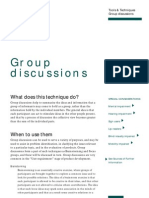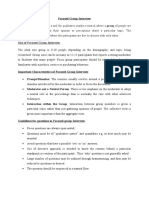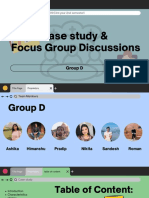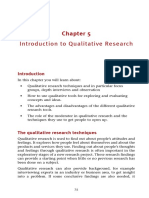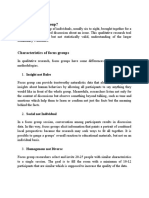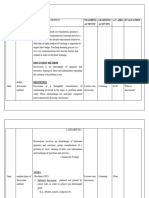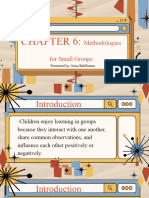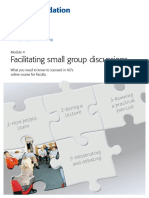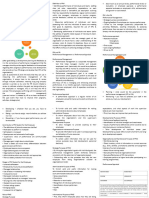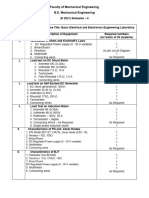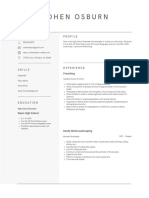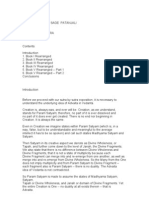0 ratings0% found this document useful (0 votes)
11 views2 Focus Group Discussion
2 Focus Group Discussion
Uploaded by
EvieThis document provides guidance on how to conduct focus group discussions. It discusses:
1. Focus group discussions involve gathering a small group of people to discuss a topic of interest to the researcher. They are led by a moderator and aim to generate qualitative data through discussion and interaction.
2. Proper planning is essential, including determining participant criteria, number of groups, and question sequence. The discussion should last 60-90 minutes for optimal results.
3. Common factors that can inhibit participation are group homogeneity and power dynamics. The moderator guides the discussion through an opening, introductory questions, key questions, and closing summary.
Copyright:
© All Rights Reserved
Available Formats
Download as DOCX, PDF, TXT or read online from Scribd
2 Focus Group Discussion
2 Focus Group Discussion
Uploaded by
Evie0 ratings0% found this document useful (0 votes)
11 views3 pagesThis document provides guidance on how to conduct focus group discussions. It discusses:
1. Focus group discussions involve gathering a small group of people to discuss a topic of interest to the researcher. They are led by a moderator and aim to generate qualitative data through discussion and interaction.
2. Proper planning is essential, including determining participant criteria, number of groups, and question sequence. The discussion should last 60-90 minutes for optimal results.
3. Common factors that can inhibit participation are group homogeneity and power dynamics. The moderator guides the discussion through an opening, introductory questions, key questions, and closing summary.
Original Description:
Original Title
2-FOCUS-GROUP-DISCUSSION
Copyright
© © All Rights Reserved
Available Formats
DOCX, PDF, TXT or read online from Scribd
Share this document
Did you find this document useful?
Is this content inappropriate?
This document provides guidance on how to conduct focus group discussions. It discusses:
1. Focus group discussions involve gathering a small group of people to discuss a topic of interest to the researcher. They are led by a moderator and aim to generate qualitative data through discussion and interaction.
2. Proper planning is essential, including determining participant criteria, number of groups, and question sequence. The discussion should last 60-90 minutes for optimal results.
3. Common factors that can inhibit participation are group homogeneity and power dynamics. The moderator guides the discussion through an opening, introductory questions, key questions, and closing summary.
Copyright:
© All Rights Reserved
Available Formats
Download as DOCX, PDF, TXT or read online from Scribd
Download as docx, pdf, or txt
0 ratings0% found this document useful (0 votes)
11 views3 pages2 Focus Group Discussion
2 Focus Group Discussion
Uploaded by
EvieThis document provides guidance on how to conduct focus group discussions. It discusses:
1. Focus group discussions involve gathering a small group of people to discuss a topic of interest to the researcher. They are led by a moderator and aim to generate qualitative data through discussion and interaction.
2. Proper planning is essential, including determining participant criteria, number of groups, and question sequence. The discussion should last 60-90 minutes for optimal results.
3. Common factors that can inhibit participation are group homogeneity and power dynamics. The moderator guides the discussion through an opening, introductory questions, key questions, and closing summary.
Copyright:
© All Rights Reserved
Available Formats
Download as DOCX, PDF, TXT or read online from Scribd
Download as docx, pdf, or txt
You are on page 1of 3
2 - FOCUS GROUP DISCUSSION
How to conduct focus group discussions?
Focus Group Discussion
• Focus group discussion (FGD) is a sort of collective
interview, directed by the researcher (moderator),
which exploits the interactive potential of the situation
in order to generate rich data
• A semi structured group discussion, which yield
qualitative data on the community level by facilitating
interaction between participants
• involves gathering people from similar backgrounds
or experiences together to discuss a specific topic of
How to conduct focus group discussions?
interest
✓ FGD provides an opportunity for researchers to STEP 1 – PLANNING THE STUDY
• It is a form of qualitative research where questions
listen to local voices emphasizing on paying attention • The origins of a study may be at the initiative of the
are asked about their perceptions attitudes, beliefs,
to the needs of those who have little or no societal researcher or may be instigated by other people such
opinion or ideas
voice. as organizations commissioning research
✓ A FGD should be between 60 and 90 minutes. • In either case, it is important to develop a (shared)
Focus Group
Question: What could happen if the FGD is shorter understanding of what the study is about.
• A focus group basically consists of a moderator plus
than 60 minutes?
six to ten group members. It is usual to have about
✓ If the FGD is shorter than 60 minutes, it is often STEP 2 – OPTIMISING THE CHOICE OF GROUP
four separate focus groups for every category of group
difficult to fully explore the discussion topic and if it is PARTICIPANTS
being studied.
longer than 90 minutes, the discussion can become • what are the important characteristics of the
• It is led by a moderator (interviewer) in a loosely
unproductive. participants in your focus groups?
structured discussion of various topics of interest and
• What sorts of participants will yield the most
includes a note taker.
Why use focus groups? satisfactory information relevant to your research
To find solutions to problems question?
To deepen understanding of quantitative data
To investigate group attitudes and beliefs STEP 3 – OPTIMISING THE GROUP STRUCTURE
When there is believed to be a difference in power • a focus group should involve all of the group
between the researcher and participants members reasonably equally. If one or two members
dominate the focus group then this defeats the
To generate ideas at the exploratory stage
purpose
To explore differences and commonalities
To investigate complex ideas and behaviors
What do you think are reasons why some members
inhibit from fully participating in group discussions?
two obvious factors that inhibit some members from
full participation:
✓If the group is too homogeneous so that everyone According to Krueger and Casey, the sequence consists These lead from the introductory questions into
shares much the same perspective on the subject of: the key question stage. They, for example, may ask
matter then discussion is likely to be curtailed. 1. opening questions participants to go into greater depth about the
✓If the group contains people of an apparently 2. introductory questions introductory questions, e.g., “why do you think it is
superior status then the group may defer to them. This 3. transition questions that attendance at church services is generally
may simply be that certain group members appear to 4. key questions and declining?”
be more knowledgeable than the others who accept 5. ending questions.
what they say unquestioningly.
The welcome Key questions
STEP 4 – PLANNING HOW MANY FOCUS GROUPS Thank everyone for coming, say who you are, These are the crucial questions for the research
• rule of thumb: three or four groups for every explain the context of the research (e.g., you are a and more time must be allowed for their
category of group studied, this is not a definitive postgraduate researcher) discussion, e.g., “what are the main factors which
statement of numbers of groups. discourage you attending church services on a
• The ‘saturation’ criterion might be appropriate. Overview of the topic weekly basis?”
- Saturation: researcher collects data until it The broad context of the focus group – why it is
appears that no new things are emerging out important to find out more, etc. Ending questions
of the study These are questions which call for the participants
- The ground rules to summarize their position in some way, e.g., “if
STEP 5 – PLANNING WHAT QUESTIONS TO ASK AND Agree not to talk over one another, agree that no your local church leader was sitting here with us,
WHEN one can speak for more than two minutes at a what are the main things you would tell them to
‘What are the characteristics of a good question?’ time, the conversation is being recorded, there are do to improve church services?”
• good question is posed in a way which communicates no correct answers, etc.
well and avoids causing confusion – so the basic STEP 6 – THINGS THAT A MODERATOR DOES
question-framing skills that you may have from in- Opening questions The moderator’s tasks include the following:
depth interviewing would be appropriate here. Easy, straightforward questions which everyone ✓At the start of the meeting, describing and
gives their answer to as a method of breaking the explaining the purpose and objectives of the session.
‘What are the characteristics of a good question?’ ice, e.g., “can you tell the group why you decide to ✓Ensuring that members of the focus group feel
• the questions should be phrased in a style suitable take part in this research?” relaxed and comfortable in the situation and feel,
for a conversation rather than writing-down. ultimately, that this was a positive experience.
• The questions should be pitched at a level Introductory questions ✓Posing clear questions for discussion.
appropriate for the sorts of people participating in your These questions introduce the topic of the ✓Controlling the discussion by asking supplementary
focus group research in a way which encourages the questions designed to open up the discussion or to
• long questions are to be avoided as should complex participants to think about their connection to the encourage the participants to focus more precisely on
ones (i.e. compound questions). topic, e.g., “what comes to mind when you think the issues which are fundamental to the research.
about the church?” ✓Ensuring that all members of the group participate
‘ideally how should questions be organized or and preventing the dominance of a small number of
sequenced during the course of the focus group?’ Transition questions individuals.
✓Highlighting differences in perspectives which ✓Feel free to change the order of the questions if participants who tend not to be highly verbal are able
emerge in the focus group discussion in order that the someone brings up something that relates to a later to share their views.
group might engage with the nature of the differences. question. ✓Training or experience in conducting group discussion
✓Stopping conversational drifts which steer the is very important because an unskilled moderator can
conversation away from the topic of the focus group. Don’ts in Focus Group Discussion unknowingly inhibit the free flow of discussion and
✓Do not ask leading questions (ones that might draw unjustifiable conclusions and findings.
suggest you are looking for a particular answer).
✓Do not ask ‘yes or no’ questions, as this does not
open up discussion, though if you inadvertently do,
you can follow up with ‘why’?
Do’s in Focus Group Discussion ✓Do not ask double-barrelled questions. People
✓Start with open questions. cannot answer two questions at once.
✓The first question should be general to get people ✓Do not tell people they are wrong. Do not correct
warmed up, say about participants’ views about the them.
topic. ✓Do not express any point of view.
✓If you hear of something you haven’t heard of before, ✓Generally, try not to shut people down. Welcome
ask the person to tell you more about it. their contribution whatever it is.
✓If someone gives a general answer, ask them to ✓If someone seems really shy, do not pressurize them
specify (give an example). to speak.
✓If someone shares an opinion, check with others in ✓Do not be embarrassed if you don’t understand
the group whether they share the view something. Go ahead and ask for an explanation. Your
✓At the beginning, explain confidentiality of the mission is to explain the unknown, the unclear and the
participants’ identifying information and assure them ambiguous.
that the information they provide will not be misused. ✓Never gossip about the focus groups after the study.
✓If there will be a report, explain who it will go to and
how it will be used. Skills required to conduct FGD
✓Go around the room and get each person to answer ✓The researcher needs to be flexible and free of
your first question, to draw everyone in. biasness and prejudices.
✓Keep praising and thanking people for their ✓A good understanding of the subject, problem, or
contribution. Make them feel their contribution is topic to be investigated is required. This includes both
welcome and worthwhile. theoretical knowledge and practical experience.
✓Be sympathetic about the issues they raise, even if ✓Proficiency in the language in which discussions will
you think some are using the focus group as a bit of a be conducted is required. Focus group discussion
whinge session. cannot be conducted through an interpreter or by third
✓Regularly ask questions of specific people, to draw person, no matter what types of skills he/she has.
people in. ✓know how to manage the discussion so that one or
two people do not dominate it, and so that those
You might also like
- Alc All Books FinalDocument163 pagesAlc All Books FinalAnwar Alturaiki100% (2)
- Kohler RXT Transfer Switch Operation/Installation ManualDocument60 pagesKohler RXT Transfer Switch Operation/Installation ManualJamesNo ratings yet
- Group Discussion StrategiesDocument49 pagesGroup Discussion StrategiesIrfan DanialNo ratings yet
- 1485497050-Focus Group Discussion - 0Document4 pages1485497050-Focus Group Discussion - 0Koushik Dey100% (1)
- QualitativeDocument26 pagesQualitativeSarah Ali JanjuaNo ratings yet
- Kusum TLDocument14 pagesKusum TLmalika.hirachan007No ratings yet
- Exploratory ResearchDocument6 pagesExploratory ResearchchadwakhemissiNo ratings yet
- P111 - Module 8Document6 pagesP111 - Module 8Mariella MarianoNo ratings yet
- Qualitative ResearchDocument16 pagesQualitative ResearchHasan Mert Kaplan100% (1)
- Focus Group DiscussionDocument20 pagesFocus Group DiscussionAIDA GEENo ratings yet
- Types of Qualitative Research MethodsDocument22 pagesTypes of Qualitative Research MethodsMary RespicioNo ratings yet
- Group Discussion StrategiesDocument46 pagesGroup Discussion StrategiesDHRUV SONAGARANo ratings yet
- 5 2023 1003 FocusGroup IQRMDocument13 pages5 2023 1003 FocusGroup IQRMRohit KumarNo ratings yet
- How To Conduct A Focus GroupDocument13 pagesHow To Conduct A Focus GroupJerome JosephNo ratings yet
- Group Discussion: Submitted By: Submitted ToDocument21 pagesGroup Discussion: Submitted By: Submitted ToAVINA SHARMANo ratings yet
- Focus Groups HelpbookDocument6 pagesFocus Groups HelpbookkatyaniNo ratings yet
- Focus Group DiscussionsDocument39 pagesFocus Group DiscussionsPauline Vanessa ReyesNo ratings yet
- Focus Group DiscussionDocument13 pagesFocus Group DiscussionKariz Alejandro LopezNo ratings yet
- Society & Culture Focus Group + Personal Reflection SlidesDocument8 pagesSociety & Culture Focus Group + Personal Reflection SlideshornaticNo ratings yet
- Topic 3 Focus GroupDocument22 pagesTopic 3 Focus GroupМария НиколенкоNo ratings yet
- Focus Group DiscussionDocument11 pagesFocus Group DiscussionKhushboo Jariwala100% (2)
- Knowledge Cafe TipsheetDocument4 pagesKnowledge Cafe TipsheetDavid GurteenNo ratings yet
- Lesson 3.4 Comm 18Document4 pagesLesson 3.4 Comm 18api-3718467No ratings yet
- Focus Group DiscussionDocument17 pagesFocus Group DiscussionMbulamaye IvanNo ratings yet
- Introducing To Qualitative and FGDDocument22 pagesIntroducing To Qualitative and FGDSakamoto HiyoriNo ratings yet
- Group Discussions: What Does This Technique Do?Document12 pagesGroup Discussions: What Does This Technique Do?Jayanthi KrishnanNo ratings yet
- Research Class - 4th MayDocument3 pagesResearch Class - 4th Mayashok_asthanaNo ratings yet
- Seven Jumps in Problem Based Learning Method: Drg. Irfan Sugianto, Mmeded., PH.DDocument15 pagesSeven Jumps in Problem Based Learning Method: Drg. Irfan Sugianto, Mmeded., PH.DMuhammad RaihansyahNo ratings yet
- Case Study and Focus Group DiscussionDocument27 pagesCase Study and Focus Group DiscussionSandesh MahatoNo ratings yet
- Focus Group DiscussionDocument22 pagesFocus Group DiscussionVlynNo ratings yet
- How To Run A Focus GroupDocument7 pagesHow To Run A Focus GroupmauroNo ratings yet
- Nominal Group TechniqueDocument5 pagesNominal Group TechniquenardstyleNo ratings yet
- Group DiscussionDocument7 pagesGroup DiscussionRahul ShramaNo ratings yet
- Focus Group HRDocument12 pagesFocus Group HRPrince RoyNo ratings yet
- Qualitative Evaluation-Chp 7Document10 pagesQualitative Evaluation-Chp 7eftychidisNo ratings yet
- Business Communication Group DiscussionDocument9 pagesBusiness Communication Group DiscussionNaresh kumar adhikariNo ratings yet
- Group ProcessesDocument34 pagesGroup ProcessesNetsu JenNo ratings yet
- MR 138 - Guide To Focus Group DiscussionsDocument6 pagesMR 138 - Guide To Focus Group DiscussionsJason WolfeNo ratings yet
- Focus Group Discussion: Fenny Etrawati, SKM, MKMDocument24 pagesFocus Group Discussion: Fenny Etrawati, SKM, MKMWasni TheresiaNo ratings yet
- 05 Market Research Ch5Document19 pages05 Market Research Ch5starmd3No ratings yet
- Presentation On Focus GroupDocument23 pagesPresentation On Focus GroupKanwal RafiqNo ratings yet
- Group Discussion StrategiesDocument44 pagesGroup Discussion StrategiesPankaj2cNo ratings yet
- Type of Learning EventsDocument22 pagesType of Learning EventsjtbolascoNo ratings yet
- Focus GroupDocument17 pagesFocus GroupAnilBahugunaNo ratings yet
- What Is A Focus Group?Document8 pagesWhat Is A Focus Group?vaibhav4444No ratings yet
- Research MethodologyDocument12 pagesResearch MethodologyManvikaNo ratings yet
- Final Effective FacilitationDocument28 pagesFinal Effective FacilitationDaksh AnejaNo ratings yet
- Focus Group Discussions: How It WorksDocument3 pagesFocus Group Discussions: How It WorksWasima Tabassum100% (1)
- Discussion and ProjectDocument18 pagesDiscussion and ProjectDevuchandana RNo ratings yet
- Designing Social Research Session 4 Summer 2022Document25 pagesDesigning Social Research Session 4 Summer 2022ranjit kaurNo ratings yet
- Qualitative, Focus-Groups and ObservationDocument67 pagesQualitative, Focus-Groups and ObservationMohamed DaudNo ratings yet
- AOF Booklet Moderating and DebatingDocument11 pagesAOF Booklet Moderating and DebatingtimoosNo ratings yet
- Focus Group DiscussionDocument42 pagesFocus Group Discussion다얀No ratings yet
- Research Chap 7Document38 pagesResearch Chap 7Tin Kyi MinNo ratings yet
- Focus Group Discussion (FGD)Document12 pagesFocus Group Discussion (FGD)Sharmyne Leigh Corpuz ZunajoNo ratings yet
- Group 6 BRM Presentation (Questions 6 & 16)Document19 pagesGroup 6 BRM Presentation (Questions 6 & 16)Benard ChimhondoNo ratings yet
- Chapter 6. MethodologiesDocument40 pagesChapter 6. Methodologiesnporras0509No ratings yet
- AOF - Booklet - Facilitating Small Group DiscussionsDocument9 pagesAOF - Booklet - Facilitating Small Group DiscussionstimoosNo ratings yet
- Focus Group Discussion: Oleh: Arlenti Pusparani, SE., MEDocument19 pagesFocus Group Discussion: Oleh: Arlenti Pusparani, SE., MEditaadeliaNo ratings yet
- Module 4 Understanding Decision Making CirclesDocument2 pagesModule 4 Understanding Decision Making CirclesÂngela GonçalvesNo ratings yet
- Understanding and Improving Group Decision-MakingFrom EverandUnderstanding and Improving Group Decision-MakingNo ratings yet
- 4 Training and DevelopmentDocument2 pages4 Training and DevelopmentEvieNo ratings yet
- 1 Performance ManagementDocument3 pages1 Performance ManagementEvieNo ratings yet
- 2 Employee Relations and EngagementDocument3 pages2 Employee Relations and EngagementEvieNo ratings yet
- Learners Who Are ExceptionalDocument4 pagesLearners Who Are ExceptionalEvieNo ratings yet
- Causes of Developmental DisabilitiesDocument4 pagesCauses of Developmental DisabilitiesEvieNo ratings yet
- Here We Are at WorkDocument1 pageHere We Are at WorkNadia Rahma PramestiNo ratings yet
- Mechanical Lab Requirement R21Document10 pagesMechanical Lab Requirement R21KARUPPASAMYNo ratings yet
- Reading 1Document6 pagesReading 1dariaNo ratings yet
- Value Chain of StarbucksDocument4 pagesValue Chain of StarbucksPhuja Mestika agusmarNo ratings yet
- Bonsai PDFDocument8 pagesBonsai PDFNguyen DatNo ratings yet
- General Motors DTC Reader InstructionsDocument10 pagesGeneral Motors DTC Reader InstructionsPablo UrbinaNo ratings yet
- Fundamentals of Physics PDFDocument2 pagesFundamentals of Physics PDFIkbal Hasan Sami0% (1)
- Seminar Types of PumpDocument21 pagesSeminar Types of Pump05 Dhiraj AldarNo ratings yet
- Cohen Osburn: Contact ProfileDocument1 pageCohen Osburn: Contact Profileapi-670774418No ratings yet
- Divide ConquerDocument7 pagesDivide Conquersadekinborno07No ratings yet
- Adobe 2012 - Global Benchmark Study On Attitudes and Beliefs About Creativity at Work, School and HomeDocument37 pagesAdobe 2012 - Global Benchmark Study On Attitudes and Beliefs About Creativity at Work, School and Homeluiz carvalhoNo ratings yet
- Open Source Software For Building Private and Public CloudsDocument4 pagesOpen Source Software For Building Private and Public CloudsNadia MetouiNo ratings yet
- Salem Academy Magazine 2012Document44 pagesSalem Academy Magazine 2012SalemAcademyNo ratings yet
- Engl321 Stylistic Analysis WorksheetDocument4 pagesEngl321 Stylistic Analysis WorksheetMatt ParmesanNo ratings yet
- SLIDES FOR CHAP 8 9 Human FactorDocument12 pagesSLIDES FOR CHAP 8 9 Human FactorVisan NaiduNo ratings yet
- The Review of Crisis Management Facing Natural Disaster: September 2013Document11 pagesThe Review of Crisis Management Facing Natural Disaster: September 2013Muhammad Rifki Adinur ZeinNo ratings yet
- Ca152d SN 10000105x0a000001-0a012434Document390 pagesCa152d SN 10000105x0a000001-0a012434Juan ParedesNo ratings yet
- Resignation WRDocument3 pagesResignation WRAngelica Jenzel Masaga NamNo ratings yet
- Psychology and SociologyDocument14 pagesPsychology and SociologykwagalaenochkeaneNo ratings yet
- 2024-2025 UH BCO CasebookDocument156 pages2024-2025 UH BCO CasebookTimothy King LincolnNo ratings yet
- Comparison of Chemical Earthing With Conventional EarthingDocument1 pageComparison of Chemical Earthing With Conventional EarthingMukesh kumar DewraNo ratings yet
- Soh Cah Toa FDocument4 pagesSoh Cah Toa FFareena ArshadNo ratings yet
- ECAM 4.1pptxDocument22 pagesECAM 4.1pptxkristineayukeNo ratings yet
- SHAHEEN-COM-ME-SPC-1093-0 - Addendum For Proportioning Pump of Reciprocating TypeDocument4 pagesSHAHEEN-COM-ME-SPC-1093-0 - Addendum For Proportioning Pump of Reciprocating TypeOliver JimmyNo ratings yet
- Andritz Combi-Zone Dryer For Extruded PelletsDocument8 pagesAndritz Combi-Zone Dryer For Extruded Pelletssarah ahmedNo ratings yet
- A Brief Guide To Writing Social TheoryDocument5 pagesA Brief Guide To Writing Social TheoryFernando Antonio UchoaNo ratings yet
- Physrevlett 13 195Document3 pagesPhysrevlett 13 195George AcostaNo ratings yet
- Ysp Eng Shri RamaDocument115 pagesYsp Eng Shri RamaRajiv Gera100% (2)

























